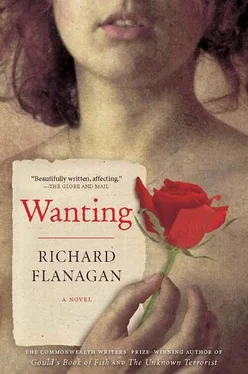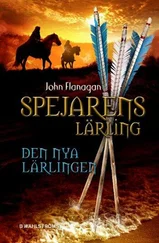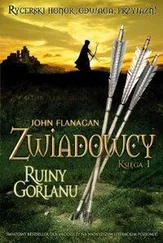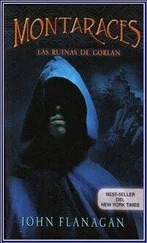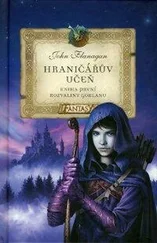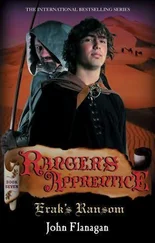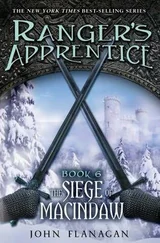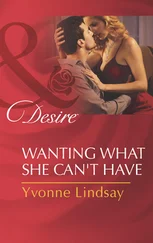‘Is God the Father writing me?’ Mathinna excitedly asked Lady Jane, when, on going to the beach at Sandy Bay for a picnic, she had seen seagull tracks in the sand, thinking perhaps Towterer was sending her some message. Lady Jane had laughed, and Mathinna realised that what was written in the world mattered not, but what was written on paper mattered immensely.
She wanted to write and so she agreed to the blindfold of shoes. She tried to feel her way through this strange world with her other senses—stumbling, falling, ever unsure—all in order to learn a little of the white magic of paper and ink.
Sometimes, as she lay alone in those two large rooms that were hers, so alone in an emptiness that felt to her greater than the starry night, she tried to unravel her many fathers. It was like the catechism: it made sense if you repeated it enough and didn’t ask questions. There was God her Father, and Jesus his Son, who was also a sort of a father; there was the Protector, who had the Spirit of God the Father; and then there was Sir John, who was also her father, her new father—so many fathers.
But she was writing not to them, but to King Romeo, whom the old people called Towterer, who had gone to where all the old people go, that place of the hunt and the forests, a world from which no one returned. And she knew the magic of white paper would reach him there and he would understand all that she was trying to tell him: her loneliness, her dreams, her wonder, her joy, her ongoing ache of sadness—all the things that were in danger of vanishing.
‘ Dear Father ,’ she wrote.
I am good little girl. I do love my father. I have got a doll and shift and a petticoat. I read books not birds. My father I thank thee for sleep. Come here to se mee my father. I thank thee for food. I have got sore feet and shoes and stockings and I am very glad. All great ships. Tell my father two rooms. I thank thee for charity. Please sir please come back from the hunt. I am here yrs daughter
MATHINNA
Lady Jane was encouraged by the letter.
‘Wisely,’ she told Mrs Lord, a common and vulgar woman said to have used her charms to advance to her position as first lady of the free settlers, ‘we removed her from the pernicious influence of the dying elements of her race, then introduced her to the most modern education an Englishwoman can receive. And,’ she could not stop herself adding, ‘the results are surprising all.’
But when Towterer failed to come to her or even reply—not after her first or second or even third letter—Mathinna’s passion for writing began to fade and she was reminded of how much her feet hurt. And when she discovered her letters stashed in a pale wooden box beneath a skull, she felt not the pain of a deceit for which she had no template, but the melancholy of disillusionment. Writing and reading, she realised, did not exist magically beyond people, but were simply another part of them.
Thereafter she contemplated the lessons of the Widow Munro as she did the thrashings she routinely received at her hand—like being caught in a storm: better avoided, but beyond judgement or anguish. And she seemed to find in her endless punishments cause only for learning something deeper and darker than the grammatical constructions and theological precepts to which she had become utterly oblivious, and her success at which she was now uncaring. One day, she set down her sampler, the bare trunk of the tree of knowledge, took off her court shoes, and walked outside.
Lady Jane discovered Mathinna playing barefoot in the garden with a sulphur-crested cockatoo she had caught and tamed. This would have been punishable but excusable. Her crime paled when compared to that of the Widow Munro, who was found open-mouthed and foul-gummed drinking gin and sugar in the kitchen with the cook.
The search for a tutor began again and turned up several short-lived successors. There was the one-time poisoner Joseph Pinguid. He arrived in a rattly trap on which a wicker chair was improbably secured by old rope, and on top of which he—a plump, red-whiskered man in ragged Wellington boots several sizes too large—was even more impossibly perched. He was undone by the same contrivance: mounting his trap to depart Government House after the first day’s lessons, an oversized Wellington slipped, he seized the chair to keep balance and the chair broke free of the tray. As old wicker and new tutor fell heavily to the ground, there tumbled out of Joseph Pinguid’s overstuffed devil-skin satchel a silver platter bearing the Franklin crest.
There followed Karl Grolz, a Viennese music master, whose abilities were limited to the viola, and then the machine breaker Peter Hay, whose Owenite thinking and endless references to Fourier and Saint-Simon revealed him as one whose thinking was possibly limited by nothing. All went quickly; none made much of an impression, except to further tarnish a project that was already regarded by much of Van Diemonian society with disdain, if not outright contempt. Had not Mrs Lord asked if Mathinna was to be Lady Jane’s pageboy?
‘As though the child were a Gibraltar monkey,’ raged Lady Jane to her husband. ‘Just some exotic ornament to our vanity.’
Abandoning any hope of finding what she sought in Van Diemen’s Land, Lady Jane, through an acquaintance in New South Wales, secured a new tutor from Sydney, who arrived by boat on a hot March morning two months later. Mr Francis Lazaretto was six feet four, a long, lean man with a shock of white hair that bristled over his angular face like a distemper brush. He wore a coat that may once have been dashing but was now as weary as he, patched with bits of grubby flannel. He was a man so funereal in appearance that Sir John found himself calling for a glass of brandy to help him recover after their first meeting, an act out of keeping with both his character and the early time of day.
‘My God, you wouldn’t even employ him as a tombstone,’ said Sir John, throwing the glass down in a single gulp.
But, as Lady Jane pointed out, on an island at the end of the world where trees shed bark instead of leaves, where birds bigger than humans roamed, and where they were charged with turning a cesspit into a perfumery, they had to make do with what was on offer.
‘If the potter’s hand has slipped with the clay he shaped for us,’ she said, ‘we have no choice but to drink as best we can from his misshapen vessels.’
Unburdened by children of her own, Lady Jane had the strongest and most unbending ideas on the nature and necessity of education for the children of others. In Francis Lazaretto she was delighted to meet a mirror who simply reflected back a reverse image of her own strong opinions. His morbid appearance, she now saw, was but a mask for an unexpected intensity.
In a former life Francis Lazaretto had failed in his ambition to become a pantomime actor, but his long study of the genius of nonsense had not been without some good effect. He dared engage Lady Jane in a pedagogical argument by seizing a copy of Rousseau’s Émile from her bookshelf and waving it about in support of his contention that Lady Jane’s ideas would create a young woman profoundly unsuited to the modern world. If nothing else, he understood the value, properly used and convincingly displayed, of a good prop.
‘The authorities concur,’ said Francis Lazaretto, now brandishing that most famous argument for modern education as an exorcist might the good book, ‘that a distinction must always be observed: a woman is educated to be governed; while your suggestions would create an absurdity—a woman like a man, self-governing.’
While this seemed to Lady Jane a distinction with which she disagreed, it proved to her the inestimable worth of Francis Lazaretto. What in another she might have found almost manic, was in him mesmerising.
Читать дальше
